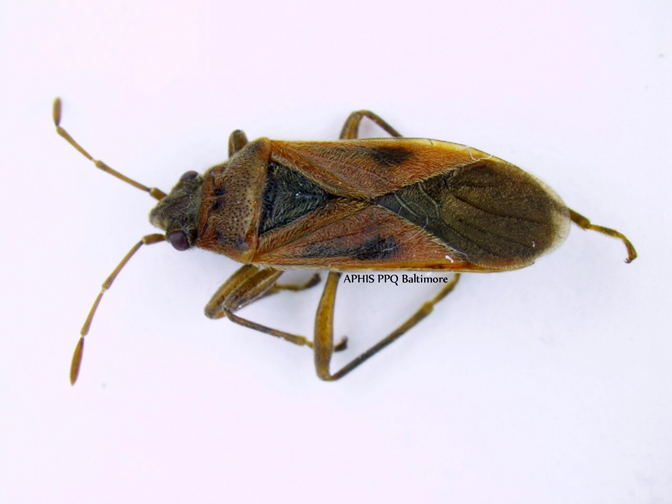Efforts Highlight CBP’s Protection of Virginia’s Agriculture Industries
NORFOLK, Va., — U.S. Customs and Border Protection (CBP) agriculture specialists at the Port of Norfolk, Va., have made several significant interceptions since the start of the fiscal year, including the region’s first documented discovery of a Plane Tree Bug, and three interceptions of one of the world’s most destructive insect pests, the Khapra Beetle.
The U.S. Department of Agriculture (USDA) national pest interception database confirmed today that the plane tree bug is indeed a First-in-Port discovery.
CBP agriculture specialists initially intercepted the specimen December 30 in a shipment of ceramic tiles from Italy. A local USDA entomologist identified the specimen the following day as Arocatus longiceps, commonly known as the Plane Tree Bug.

Agriculture specialists safeguard Virginia agriculture industries against invasive insect species, including the region's first reported interception of an Arocatus longiceps, commonly known as the Plane Tree Bug, in a shipment of Italian ceramic tiles in Norfolk, Va., December 30, 2014.
The plane tree bug hails from the Eastern Mediterranean and occurs across Europe and the Near East. It feeds on plane tree seeds, but it may also feed on various ornamental tree seeds.
A local USDA entomologist also confirmed specimens from three additional insect interceptions as Trogoderma granarium, commonly known as the Khapra beetle. The first two interceptions occurred November 12 and 21 in shipments of organic soybeans from India. The latest interception occurred January 30 in a shipment of split lentils and spices from the United Arab Emirates.
These invasive insect pests were part of 59 actionable and non-reportable CBP interceptions since October 1, 2014, the start of the federal government’s current fiscal year. Other actionable interceptions included 29 invasive weed interceptions, 4 mollusk (snail) interceptions, and 24 other insect interceptions.
“Customs and Border Protection agriculture specialists take very seriously their job of intercepting potentially harmful insects, plants, plant diseases and animal diseases at our nation’s border every day,” said Mark Laria, CBP Port Director for the Area Port of Norfolk. "These significant pest interceptions illustrate the vital role CBP agriculture specialists play in protecting Virginia’s agricultural industries and our nation’s economic interests."
The Khapra beetle, native to India, is one of the world’s most destructive insect pests of grains, cereals and stored foods, which are some of the United States’ top export commodities. It is labeled a ‘dirty feeder’ because it damages more grain than it consumes, and because it contaminates grain with body parts and hairs. These contaminants may cause gastrointestinal irritation in adults and is especially harmful to infants.
The Khapra Beetle remains the only insect in which CBP takes regulatory action against, even while in a dead state.
“If allowed to become established in the U.S., Khapra beetle has the potential to cause wide-reaching damage, including extensive economic impact to U.S. grain industries,” said Laria.
According to the USDA, previous infestations of Khapra Beetle have resulted in massive, long term-control and eradication efforts at great cost to the American taxpayer.
California implemented extensive eradication measures following a Khapra beetle infestation discovered there in 1953. The effort was deemed successful, but at a cost of approximately $11 million. Calculated in today’s dollars, that would be about $90 million.
Currently, invasive species cause an estimated $136 billion in lost agriculture revenue annually.
CBP agriculture specialists have extensive training and experience in the biological sciences, risk analysis, and in imported agriculture inspection techniques. CBP agriculture specialists are the first line of defense in the protection of U.S. agriculture, forest and livestock industries from exotic destructive plant pests and animal diseases.
On a typical day nationally, CBP agriculture specialists inspect almost 1 million travelers to the U.S., and a significant amount of air and sea cargo imported to the United States. They intercept 4,379 prohibited meat, plant materials or animal products, including 440 insect pests.
Please visit CBP’s Agriculture Protection webpage to learn how CBP safeguards our nation’s economy by protecting our agriculture industries.

